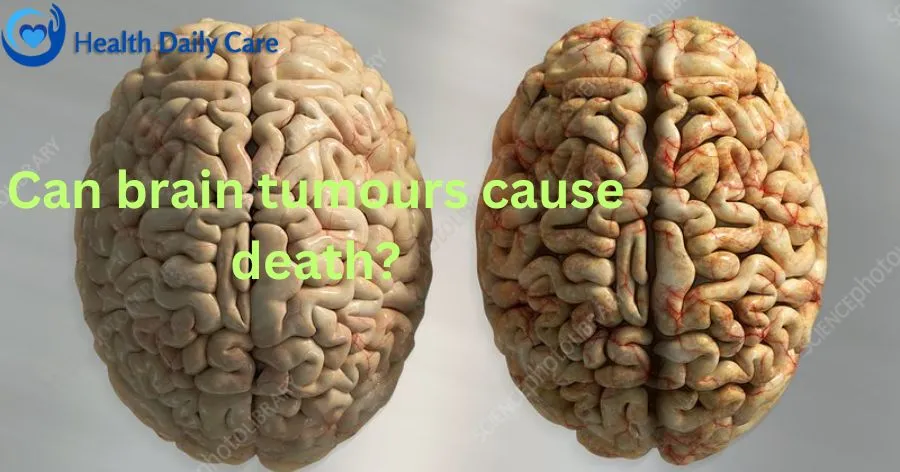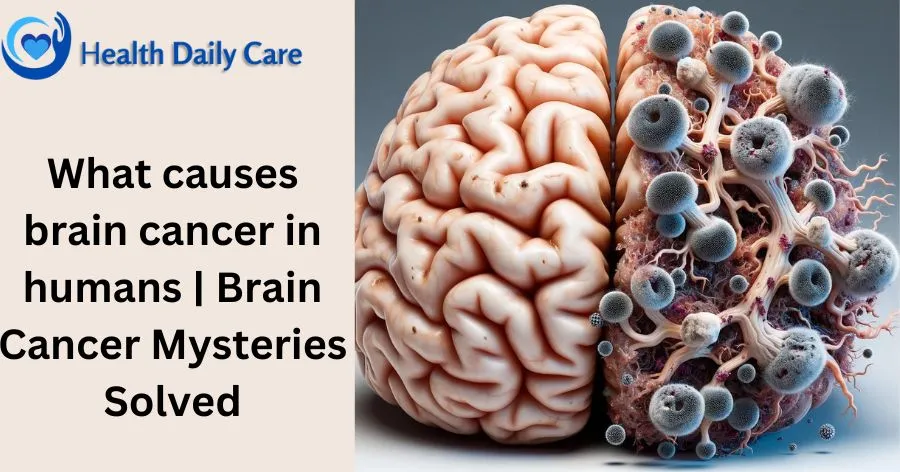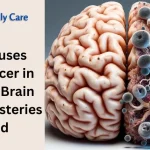The human brain, a complex and great organ, is the key to our thoughts, verbs and emotions. Basically, brain cancer is a diagnosis that many people are afraid of the heart, a complex and often mysterious disease.
However, have you ever thought about what causes brain cancer in humans? I join a ride in the deepest of the internal work of the brain because I unveil the disguise by the trigger to keep this deadly disease.
From environmental reasons to the genetic tendencies, let’s find the complex web of possible factors behind one of the most terrifying diagnoses: brain cancer in humans.
Is brain cancer genetic?
Brain cancer is a complex disease with various contributors, one of which is genetics. However, in most cases of brain cancer, direct inheritance is not obtained. Basically, it can increase the risk of developing the disease from certain genetic mutations.
Researchers have identified specific genes that are involved in the increased sensitivity of brain tumours and, in some cases, highlight the role of genetics.
It is important to note that having a family history of brain cancer does not mean that you will inherit it. In general, environmental factors and other non-genetic factors also play an important role in the development of such cancer.
However, for people with a strong family history of brain tumours, genetic counselling and testing can be recommended to evaluate their risks and take possible preventive measures.
How do you find cancer in the brain?
Generally, finding cancer in the brain is a complex process that involves various diagnostic techniques. A common method is to use imaging tests like MRI or CT scan to detect any abnormal growth of the brain or tumour.
These images provide detailed information about the size, location, and properties of the cancer cells present.
In addition, a biopsy can be done where a small sample of tissues is extracted from suspected tumours for further analysis.
Basically, it helps to determine the correct type of cancer present in the brain and grade. Furthermore, advance technologies, such as molecular profiling can now use to detect specific genetic mutations in brain tumours. Allows more personalized treatment procedures suitable for separate patients.
In some cases, symptoms and symptoms such as constant headaches, itching, vision problems, or cognitive activities can further investigate further investigation towards brain cancer diagnosis.
In particular, it is important for healthcare suppliers to use modern diagnostic equipment to properly detect and treat brain cancer immediately.
Can brain tumours cause death?
In general, brain tumours can be lethal. If not treated, death is likely to cause death. Basically, the position of the tumour in the brain, its size and growth rates play an important role in determining the results of each person.

Sometimes, even gentle tumours can become fatal if they are located in a critical area of the brain that affects important functionality.
Treatment options such as surgery, chemotherapy, and radiation therapy target tumours to remove or shrink and improve the results. However, despite the progress of medical technology, some aggressive types of brain tumours can still be challenged.
It is necessary for individuals with symptoms such as endless headaches, itching, vision, or cognitive weaknesses to take care of the right diagnosis and appropriate treatment plan following their specific conditions.
What causes brain cancer in humans?
Generally, brain cancer in humans can occur by a complex interplay of genetic and environmental factors. One of the common causes is the conversion of certain genes that control the growth and division of cells, causing the uncontrollable expansion of cells in the brain.
These transformations can be obtaine or acquir in succession due to factors such as radiation or suppression of chemicals.
Furthermore, infections like certain viruses are associat with the risk of growth of brain cancer. Extra, the choice of living, such as smoking, weak diet and physical activity, can contribute to the development of brain tumours.
Furthermore, specific treatment conditions for other cancers or previous treatment can also increase the chances of brain cancer.
In particular, the multifactorial nature of the causes of brain cancer is important for preventing burden and initial detection.
Thus, by raising awareness about potential risk factors and promoting a healthy living habit.
It is possible to reduce the tendency of this devastating disease in the human population around the world.
Brain cancer risk factors
Some risk factors for the development of brain cancer include ionizing radiation, genetic causes and specific environmental toxins.
Studies have shown that people who are in contact with high-level radiation through treatment or accident are at high risk of developing brain tumours.
Below are some more reasons.
Genetic factor
Some genetic mutations, such as BRCA 1 and BRCA 2, increase the risk of brain cancer. As a result, the family history of the brain tumours also enhances the sensitivity, which indicates the genetic trends found in the legacy.
Environmental exposure
Exposure to ionizing radiation from radiation therapy or atomic fruitout can increase the risk of brain cancer. It also creates a potential risk of professional exposure to specific chemicals and electronic magnetic fields. Although I have discussed above, what causes brain cancer in humans?
Because of the lifestyle and health
Smoking and excess alcohol consumption are associat with high rates of brain cancer. Additionally, high diets in obesity and processed foods can contribute to an increase in the sensitivity of brain tumours.
Brain cancer risk factors that can be controlled
One of the major causes that can increase the risk of brain cancer is in contact with some environmental toxins, such as pesticides and solvents.
To reduce the risk, individuals can choose organic production, use natural cleaning products, and avoid prolonged exposure to harmful chemicals.
Basically, another controlling risk for brain cancer is obesity and a subtle life. By maintaining a healthy weight through regular practice and a balanced diet, people can reduce the chances of this type of cancer.
In addition, smoking has been identified as an important risk for various types of cancer, including brain cancer. Smoking can significantly reduce the risk of developing brain tumours to quit or start in the first place.
This controlled risk causes to avoid the factors; people can take active steps to reduce the overall risk of getting brain cancer.
Identification of a cancer stem cell in human brain tumours
Researchers recently detected cancer stem cells in human brain tumours and discovered a groundbreaking in the field of oncology. In general, these cells, characterized by the ability to distinguish between the tumours and the type of different cells. Play an important role in the formation and progress of the tumour.
In particular, these cancer stem cells are especially target; fancy treatments can be developed to deal with brain tumours more effectively and improve the patient’s results.
For this I have discussed above, what causes brain cancer in humans? The unique features of cancer stem cells in brain tumours expose new ways for personalized Medicine Sad.
Researchers expect to increase the effectiveness of treatment by focusing on the therapy that directly targets these elastic cells and reduces the chances of repetition of tumours.
Furthermore, studying the underlying molecular processes of the behaviour of cancer stem cells can lead to the development of innovative diagnostic equipment for primary detection and advanced observation of brain tumours.
Frequently Asked Questions
What is a Stage 4 brain tumour?
The Stage 4 brain tumour refers to the most advance phase where cancer is widely spread in the brain or other parts of the body; often, significant neurological symptoms and complications occur.
Is brain tumour 100% curable?
Brain tumours are not always 100% curable. The results of the treatment vary depending on factors such as tumour type, location, stage and individual health factors. Some tumours can be successfully treat; others may be more challenging.
Can brain cancer be cured?
Brain cancer can sometimes cure, especially if surgery, radiation therapy, chemotherapy and target therapy are detect quickly and are immediately treat. However, the results vary depending on separate factors.
Can people survive brain cancer?
People can avoid brain cancer. The survival rate depends on the type and stage of the cancer, the effectiveness of the treatment and factors such as the person’s overall health and therapy reactions.
Bottom Line
Finally, although the exact causes of brain cancer in humans are not fully understood, several factors have been identified as possible contributors.
These include genetic mutations, ionizing radiation, some environmental causes and family history of the disease. Researchers need to continue studying these factors for better resistance strategies and treatment development for this destructive condition.
To raise awareness about risk factors related to brain cancer. People can take active steps towards reducing the possibility of developing their disease. Together, we can work towards a future where brain cancer is no longer fatal anxiety.













